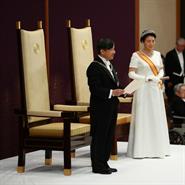Date : 26/12/2019

KUWAIT, Dec 26 (KUNA) -- New leaders came to power while others left office in 2019, a year where people in some countries revolted against the ruling regimes seeking better living conditions, equality and justice.
Following are major events related to world leaders.
Jan. 20: The constitutional court of the Democratic Republic of the Congo announced Felix Tshisekedi's presidential election winner.
Jan. 23: US President Donald Trump officially recognizing the President of the President of the Venezuelan National Assembly, Juan Guaido, as Venezuela's Interim President.
Jan. 31: Sultan Abdullah bin Ahmad Shah sworn as the new Malaysian king after the resignation of Malaysian King, Sultan Muhammad V, with no reasons given.
Feb. 26: Nigerian Independent National Electoral Commission announces winning of Nigerian President Muhammadu Buhari a second term at the presidency elections.
March 4: Leader of Estonia's opposition center-right Reform party Kaja Kallas wins parliamentary elections and became the country's first female prime minister.
March 5: Senegal's Macky Sall claims victory on presidential elections with 58 percent of votes.
March 8: Finland's government resigns after failing in plans to reform the healthcare throwing the country into political limbo.
March 19: Kazakhstan's president announces his retirement after nearly 30 years as leader of the central Asian nation.
March 31: Liberal lawyer Susanna Caputova won the presidential election in Slovakia with 58 percent of votes.
April 4: Former Maltese Minister of Foreign Affairs George Vella was sworn in as president of the island of Malta.
April 12: North Korea underwent major changes in state leadership, including the appointment of Choe Ryong-hae as the country's new honorary president and prime minister.
April 15: The leader of the left-wing Social Democratic Party of Finland won the parliamentary elections after his party won 17.8 percent of votes.
April 16: Colonel Osman Ghazali won the second round of presidential elections in the Comoros with 40.98 percent of votes.
April 21: Comedian Volodymyr Zelensky scored a landslide victory in Ukraine's presidential election after winning more than 70 percent of votes.
May 1: Japan's new emperor Naruhito officially took office after abdication of Emperor Akihito.
May 21: Indonesian President Joko Widodo won the presidential election with 55.5 percent of votes.
May 23: The Indian People's Party of Bharatiya Janata, led by Prime Minister Narendra Modi, won the country's general elections.
May 30: Austrian President Alexander van der Bellen appointed Constitutional Court Judge Berjeta Berlan as the first Chancellor in the republic history.
June 6: Denmark's Socialist Democratic Bloc, led by Mette Frederiksen, won 91 of the 179 parliamentary seats in the general elections to be the country's prime minister.
June 12: Kassym-Jomart Tokayev was sworn in as president of Kazakhstan after winning presidential elections after former President Nursultan Nazarbayev stepped down from power.
June 24: Turkish opposition candidate Ekrem Imamoglu won the Istanbul municipal elections with 54 percent of votes.
July 1: Mauritanian Constitutional Council officially announced the victory of Mohammad Ould Ghazouani in the presidential elections with 52 percent of votes.
Oct 20: Indonesian President Joko Widodo was sworn in for a second five-year term in a ceremony that was attended by 17 heads of state and government after winning 55.5 percent of votes in the presidential elections held on May 21.
Oct 22: Japan's Emperor Naruhito proclaimed his ascension to the throne in an elaborate ceremony that was attended by a thousand people, including leaders and senior officials from 180 countries and world organizations.
Oct 23: Tunisian President Qais Saied took the oath of office at parliament after garnering 72.71 percent of votes in the presidential election.
Oct 26: Bolivia's supreme court declared that Evo Morales won a fourth term of office after winning 47.08 percent of votes while his main opposition rival got 36.51 percent in the presidential polls.
Oct 27: King Philippe of Belgium appointed the Budget and Public Services Minister Sophie Wilmes as new caretaker prime minister, becoming the country's first woman to have this position.
Oct 28: Centre-left opposition candidate Alberto Fernandez was elected president of Argentina by obtaining 47.79 percent of votes in the presidential vote.
Oct 29: Lebanese Prime Minister Saad Al-Hariri tendered resignation amid surging protests nationwide.
Nov. 4: The UK's House of Commons elected Labor Party MP Lindsay Hoyle as Speaker to succeed former Speaker John Bercow.
Nov. 10: President of Bolivia Evo Morales resigned after three weeks of public protests against him in the country.
Nov. 10: The Spanish ruling Socialist Workers Party (PSOE) won the majority of seats (120 out of 350) in the general elections.
Nov. 10: President of Botswana Mokgweetsi Masisi swore the constitutional oath after winning a second presidency term.
Nov. 13: Bolivian opposition leader Jeanine Anez announced herself as an interim President of Bolivia, after former President Evo Morales resigned.
Nov. 13: Tunisia's parliament elected Ennahda Movement leader Rached Ghannouchi as Speaker.
Nov. 15: Tunisian President Kais Saied tasked Ennahda Movement candidate Habib Al-Jamali with forming a new government.
Nov. 16: Former Sri Lankan Defense Minister and opposition candidate Gotabaya Rajapaksa won the presidential elections after receiving 51.62 percent of votes.
Nov. 21: Israel's Blue and White party leader Benny Gantz failed in forming a new government.
Nov. 24: Romania President Klaus Iohannis won the re-election round for presidency after receiving 66.5 percent of votes.
Dec. 10: Finland's parliament approved nominating the 34-year-old politician Sanna Marin member of the Social Democratic party, as Prime Minister, becoming world youngest Prime Minister.
Dec. 19: Abdulmajeed Tabboune was sworn in as Algerian President after winning 58 percent of votes. (end)
eng